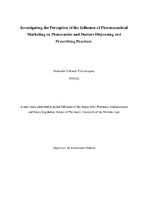| dc.contributor.advisor | Obikeze, Kenechuku | |
| dc.contributor.author | Tichiwangana, Nothando Yollanda | |
| dc.date.accessioned | 2022-02-07T08:11:57Z | |
| dc.date.available | 2022-02-07T08:11:57Z | |
| dc.date.issued | 2021 | |
| dc.identifier.uri | http://hdl.handle.net/11394/8675 | |
| dc.description | >Magister Scientiae - MSc | en_US |
| dc.description.abstract | Pharmaceutical marketing via a wide range of promotional tools to doctors and pharmacists is
one of the primary methods used by the pharmaceutical industry to drive product sales.
Pharmaceutical representatives are the key personnel employed in promoting pharmaceutical
products, and their interactions with doctors and pharmacists may present a conflict of interest
which may result in irrational prescribing or dispensing with the attendant negative outcomes
for patients. As such, an awareness of the influence pharmaceutical marketing may have on
their prescribing or dispensing practice is essential to mitigate its negative impact on
professional practice. Although several studies have investigated the perception of healthcare
professionals on the influence pharmaceutical marketing has on their prescribing and
dispensing behaviour, no study has evaluated this in healthcare professionals in South Africa.
This study aimed to investigate the perceptions and attitudes of doctors and pharmacists in
private sector practice in Gauteng province of South Africa on the influence of marketing by
pharmaceutical representatives on their decisions when prescribing and dispensing medication
to patients.
The study involved a mixed methods approach, using a semi-structured questionnaire to elicit
information on doctors and pharmacists’ perceptions on gifts offered by pharmaceutical
representatives, and the influence of pharmaceutical marketing on their dispensing and
prescribing practice. A sample consisting of 120 doctors and pharmacists practising in the
private sector of Gauteng province and who interacted with pharmaceutical representatives as
part of their practice were included in the study using convenience sampling. The responses to
the questionnaire were collated using descriptive statistics, and data analysed to identify
relationships between the respondent’s perceptions and specific prescribing and dispensing
practices using SPSS statistical software. The Chi-squared test was used to test for the
differences between groups, and the Spearman rho coefficient used to analyse associations
between identified themes in the data in SPSS. Ethical approval for the study was obtained
from the University of Western Cape | en_US |
| dc.language.iso | en | en_US |
| dc.publisher | University of the Western Cape | en_US |
| dc.subject | University of the Western Cape | en_US |
| dc.subject | Pharmaceutical marketing | en_US |
| dc.subject | Healthcare workers | en_US |
| dc.subject | Continuous professional development | en_US |
| dc.title | Investigating the Perception of the Influence of Pharmaceutical Marketing on Pharmacists and Doctors Dispensing and Prescribing Practices. | en_US |
| dc.rights.holder | University of the Western Cape | en_US |

